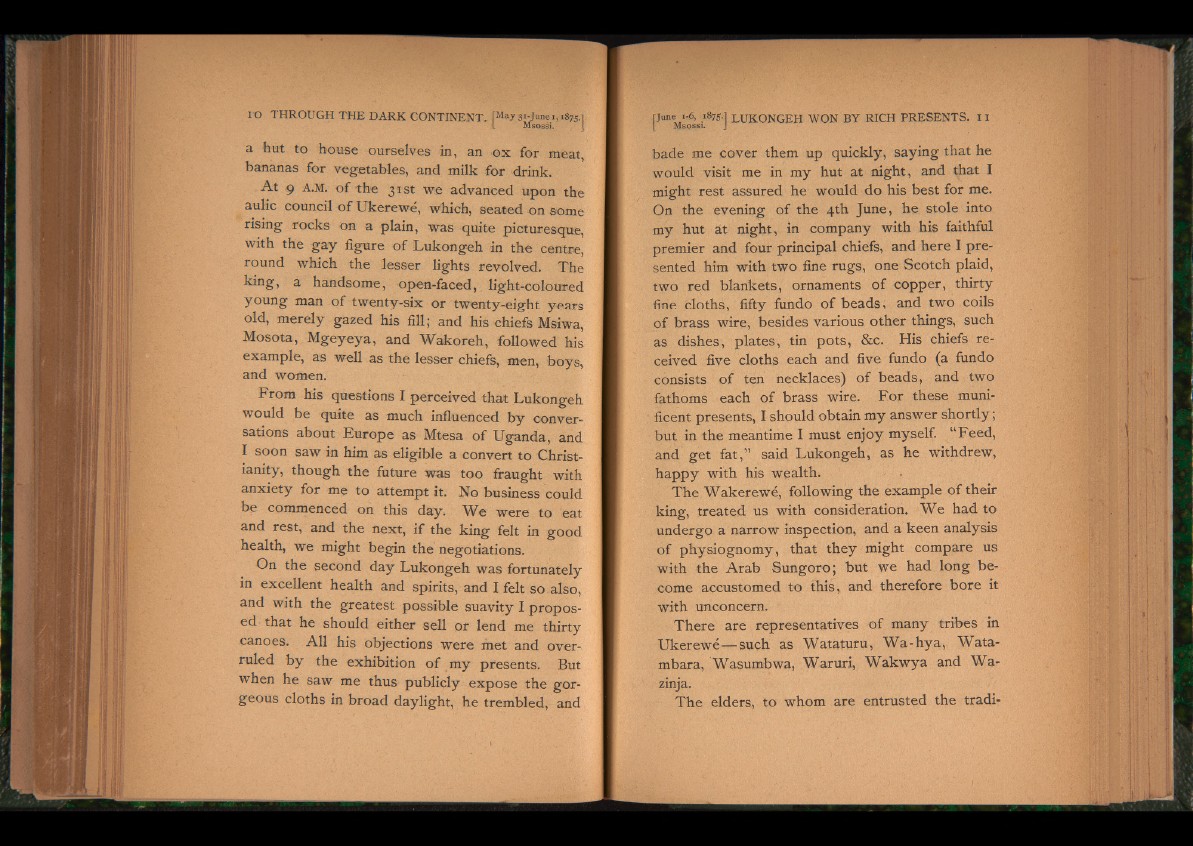
a hut to house ourselves in, an o x for meat,
bananas for vegetables, and milk for drink.
A t 9 a .m . o f the 31st we advanced upon the
aulic council o f Ukerewe, which, seated on some
rising rocks on a plain, was quite picturesque,
with the g a y figure o f Lukongeh in the centre,
round which the lesser lights revolved. The
k in g , a handsome, open-faced, light-coloured
young man o f twenty-six or twenty-eight years
old, merely gazed his fill; and his chiefs Msiwa,
Mosota, M g e y e y a , and Wakoreh, followed his
example, as well as the lesser chiefs, men, boys,
and women.
From his questions I perceived that Lukongeh
would be quite as much influenced b y conversations
about Europe as Mtesa o f Uganda, and
I soon saw in him as eligible a convert to Christianity,
though the future was too fraught with
anxiety for me to attempt it. No business could
be commenced on this day. W e were to eat
and rest, and the next, i f the king felt in good
health, we might begin the negotiations.
On the second day Lukongeh was fortunately
in excellent health and spirits, and I felt so also,
and with the greatest possible suavity I proposed
that he should either sell or lend me thirty
canoes. A ll his objections were met and overruled
b y the exhibition o f my presents. But
when he saw me thus publicly expose the gorgeous
cloths in broad daylight, he trembled, and
[•June 1-6, 1875.] LUKONGEH WON BY RICH PRESENTS. I I
[ Msossi. J
bade me cover them up quickly, saying that he
would visit me in my hut at night, and that I
might rest assured he would do his best for me.
On the evening o f the 4th June, he stole into
my hut at night, in company with his faithful
premier and four principal chiefs, and here I presented
him with two fine rugs, one Scotch plaid,
two red blankets, ornaments o f copper, thirty
fine cloths, fifty fundo o f beads, and two coils
o f brass wire, besides various other things, such
as dishes, plates, tin pots, &c. His chiefs received
five cloths each and five fundo (a fundo
consists o f ten necklaces) o f beads, and two
fathoms each o f brass wire. F o r these munificent
presents, I should obtain my answer shortly;
but in the meantime I must enjoy myself. “ Feed,
and g e t fa t,” said Lukongeh, as he withdrew,
h appy with his wealth. - .
The Wakerewe, following the example o f their
king, treated us with consideration. W e had to
undergo a narrow inspection, and a keen analysis
o f physiognomy, that they might compare us
with the Arab Sungoro; but we had long become
accustomed to this, and therefore bore it
with unconcern.
There are representatives o f many tribes in
Uke rewe— such as Wataturu, W a -h y a , Wata-
mbara, Wasumbwa, Waruri, W a kw y a and Wa-
zinja.
T he elders, to whom are entrusted the tradi